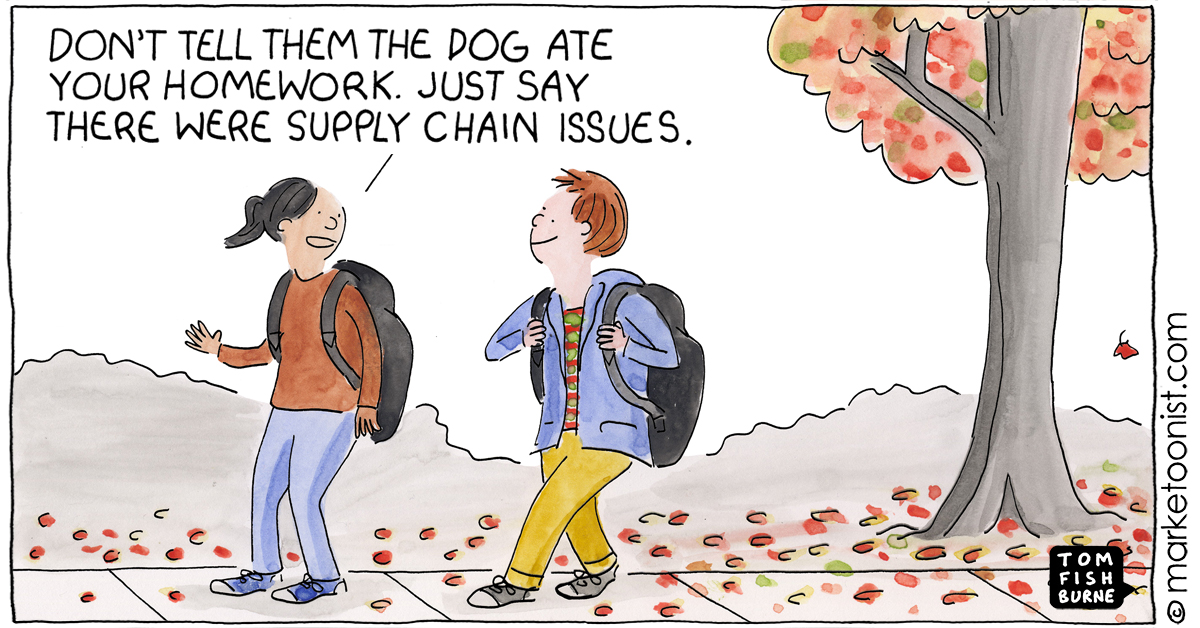Editor’s note: for this week’s blog we opted to take a break from hard news coverage and focus on something a little lighter. It’s still all about the supply chain, but with a touch of humor. We hope you enjoy.
There was a young man who did say
To his mom on her fiftieth birthday
“Dear mother I bought
That gift that you sought,
But it’s stuck on a ship off LA”
Supply chain is trending. The pandemic has rocketed the industry from relative obscurity to excessive fame. Over the last two years, supply chain issues have taken the blame for late birthday presents, delayed roller skate deliveries, high used car prices, and even the slow pace of repair and rebuilding after last summer’s Hurricane Ida.
While we wouldn’t make light of the consequences of supply chain disruptions, this is also a time to savor and enjoy the mainstream attention our profession is receiving. For us in the industry, we’ve known all along that supply chains power the world: they keep goods moving, keep people in their jobs. And, when something in the chain breaks – be it the inability to get a raw material from a tier-four supplier or a large cargo ship getting stuck in the Suez Canal – not having visibility into your entire supply network can wreak major havoc.
But back to the part about how supply chain is having a moment.
“What a time to be alive,” sang Elizabeth Raman-Grubbs in a TikTok video celebrating the fact that her master’s in supply chain management from MIT had finally become something cool. After years of trying to explain her profession to bored listeners, Raman-Grubbs is enjoying the fact that her skills and expertise are now in demand—if not necessarily helpful—from friends and family members frustrated by delays and shortages, according to a recent Wall Street Journal about the lighter sides of supply chain disruptions.
In other social media posts, comedians and online celebrities have blamed the supply chain for their Monday morning blues, for being single, for having full voicemail boxes. Supply chains have even made appearances across the late night show circuit. Last fall, The Late Show host Stephen Colbert deadpanned, “There is one thing that we do not have a shortage of, and that is shortages.” And then at the beginning of the holiday shopping season, Colbert noted that surveys showed large percentages of shoppers planned to order excess gifts in case of cancellations or delays. “That’s 16 maids a-milking, that’s 20 lords a-leaping, and forget about 12 drummers drumming—just hire the Texas A&M marching band,” he joked.
Businesses have created their own supply chain slogans and memes, according to The Journal. A Florida movie theater tweeted, “No supply chain issues here!” A British Columbia syrup and cocktail mix supplier posted “Canadian Syrups for Canadian Cafés. No Supply Chain Issues,” on Instagram in January.
Supply chain humor isn’t new, and an Internet search will quickly turn up such pre-pandemic gems as these from Mondoro.com:
“If lawyers are disbarred, clergypersons defrocked, electricians should be delighted, cowboys deranged, drycleaners depressed, and supply chain managers fulfilled.”
“Why did the supply chain manager wake up in the middle of the night with a cold sweat? She was having another logistical nightmare.”
Seriously, though: this is an ideal time to highlight the long-term ROI that can be gained for your company with upgraded supply chain risk management capabilities including Multi-Tier Mapping and supplier risk assessments and scoring. And, if your c-suite needs some more convincing, you can always try a little humor. Maybe try a limerick, something like:
It once seemed our work was so boring,
But now you’re obsessed with reshoring.
Want to de-globalize?
More complex than you realize.
Let’s map to the third tier, then start risk scoring.





